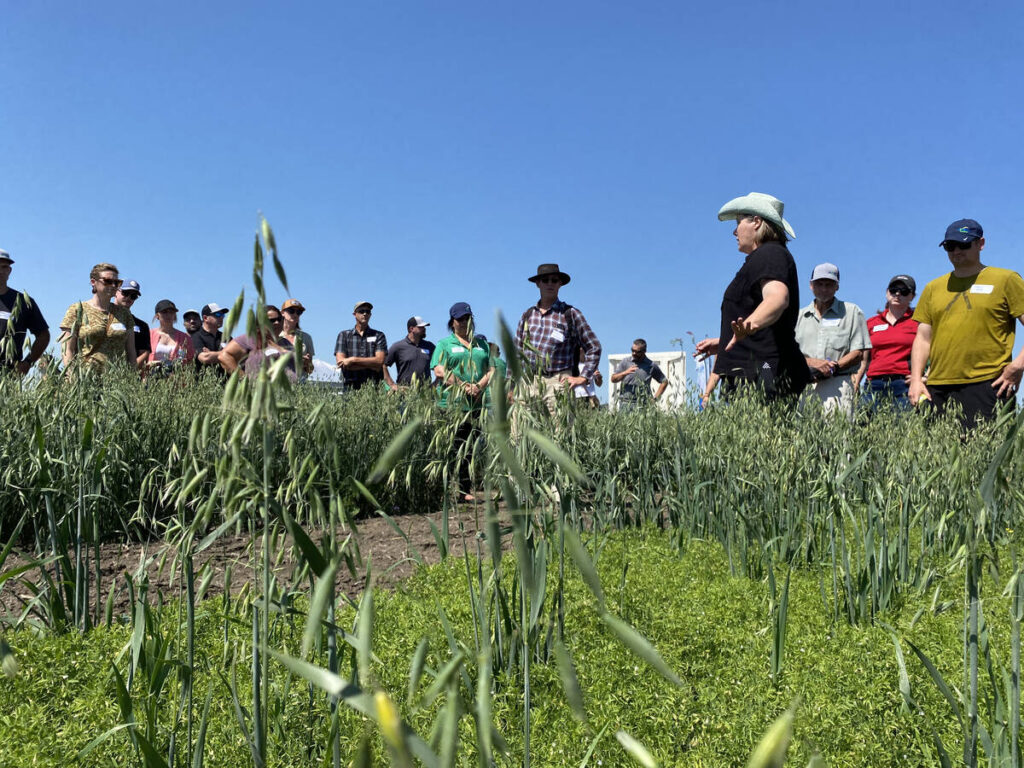Agriculture extension evolves | The Western Producer

WINNIPEG — Tracy Herbert has a unique job title.
She’s the knowledge mobilization and communication director with the Beef Cattle Research Council.
Related stories:
Communication directors are a dime a dozen in Canada’s ag industry, but what exactly is knowledge mobilization?
Read Also


Pending Canada Post service disruption
Delivery of our paper editions may be disrupted as of May 23 by the ongoing labour dispute between Canada Post…
It’s slightly different than agricultural extension, which is more about sharing the best information to farmers about some innovation, the latest research or new practice.
Knowledge mobilization is creating awareness and then persuading producers to take action by changing what they do or adopting a new practice, Herbert said.
“Getting information to producers is only the first step,” she said from her home office in Lloydminster, Sask.
Once farmers have the information, the next step is about answering a question: is this practice beneficial for my farm or not?
If it is beneficial and they decide to give it a try, the farmer might need some help implementing the practice or the new technology.
“Then once you implement … you need to evaluate whether it was the right decision,” Herbert said.
“Do you keep doing this, or do I drop it?”
Going from awareness to action is not a simple or straightforward process. The critical piece of the puzzle for it to actually happen is a personal relationship between the person extending the knowledge and the farmer, Herbert said.
“Without someone you have a trusted relationship with, who can provide that customized guidance … it’s far less likely that you’ll get to the last step in that process (adoption).”
In other words, in an era of YouTube, artificial intelligence, smartphones, webinars and Instagram, personal relationships do matter.
Face to face conversations with farmers make a huge difference in knowledge mobilization.
“Absolutely. And there’s not enough of it (in Canada),” Herbert said.
There was a time, maybe 30 to40 years ago, when provincial government reps were the clear-cut leaders of ag extension in Canada.
Provincial agriculture departments still employ specialists in regional offices who are responsible for delivering the latest research and best information to livestock and crop producers.
However, the number of provincial extension specialists has shrunk.
In some provinces, they have almost disappeared.
The Alberta government laid off about 135 Alberta Agriculture employees who worked in primary agriculture, the Western Producer reported in October 2020. That included research and extension staff.
“People always forget that Alberta Agriculture had offices across the province and there was a lot of co-operative work that was done,” said Ross McKenzie, a retired department employee.
“That capacity will be lost. You’ll see (applied research) groups … kind of pick up and carry on, but you won’t have that co-ordinated effort across the province that we had.”
The change in Alberta’s approach was significant, but BCRC realized there was a problem with cattle and forage research extension long before 2020.
The BCRC mandate is to fund beef, cattle and forage research using dollars from the Canadian beef cattle checkoff. The BCRC is a division of the Canadian Cattle Association.
Prior to 2011, when a research project was complete, the industry would “leave it up to the existing system” to extend the findings to producers, Herbert said.
That approach wasn’t working, partly because of provincial cutbacks.
So, BCRC got into the extension business.
“Thanks to federal funding … we were able to make that happen,” Herbert said.
“We dipped our toe into it about 15 years ago… We’ve been growing and expanding ever since.”
Other national and provincial commodity groups also responded to the lack of extension. Most now employ an extension specialist or agronomist to fill the gap between research and knowledge transfer to farmers.
SaskOilseeds, for instance, has a canola extension specialist and a flax extension specialist.
This doesn’t mean that provincial employees aren’t doing their jobs, but three livestock specialists cannot cover an entire region such as western Saskatchewan, which is the size of Belgium.
“There’s not enough of it,” Herbert said, referring to people who have direct relationships with cattle producers.
“Saskatchewan is fortunate that they still have regional extension specialists (for livestock). Manitoba has a couple left, but far fewer than they did 10 to 20 years ago…. Most other provinces virtually don’t have any.”
Manitoba employs six livestock and forage specialists, says the Manitoba Agriculture website.
The BCRC uses a multi-media, “shotgun” approach to deliver research results and information on best practices to producers, Herbert said.
That includes videos, articles, webinars, podcasts and X (Twitter).
The council also shares information with boots on the ground — provincial staff and industry reps — because collaboration is key to Canada’s approach.
“Because extension in our sector is de-centralized, fragmented and under-funded, it’s very important that the individuals and organizations that are involved in beef and forage extension … are able to communicate and collaborate with each other,” she said.
Fragmented is not an upbeat word. A more positive description of Canada’s approach would be “partnerships.”
“It’s all about collaborations and partnerships because there isn’t one group that has enough resources to do it all,” said Tracy Evans, executive director of Saskatchewan Agriculture’s regional services branch.
Evans manages the ministry’s 10 regional offices, which are distributed across the province. The offices employ specialists who “offer advice and support to the areas of livestock, crops, range management, program funding and agri-environmental practices,” says the Saskatchewan Agriculture website
Evans and her team work closely with commodity groups, the Western College of Veterinary Medicine, Agriculture Canada and the University of Saskatchewan to ensure that regional experts with the province are providing a unique service.
“We focus on not duplicating what industry does but rather complementing the work they do,” Evans said, pointing to Saskatchewan Agriculture’s Crop Diagnostic School, where agronomists, agrologists and farmers can learn about the most relevant and useful crop production research.
“It has an outreach of over a few hundred people that attend one of the two days…. We take the ‘train the trainer’ approach,” Evans said.
“I can say with confidence that the ministry is a trusted source of unbiased information across a variety of topics.”
A decentralized approach to extension can be effective, but it does require a team effort and robust communication between extension specialists.
BCRC manages something called the Beef Knowledge Mobilization Network, which brings together people who are involved in beef and forage extension efforts.
There are about 260 people in the network, and around 125 met in person last year in Saskatoon. They also meet online.
The basic idea is to encourage communication and collaboration.
That’s helpful, but knowledge mobilization is “hard,” Herbert said.
Webinars, podcasts, articles, YouTube videos and other information are much less effective unless there’s a specialist who has a direct relationship with a producer.
“That piece of the pie is too small right now.”
Contact robert.arnason@producer.com
Source: www.producer.com


